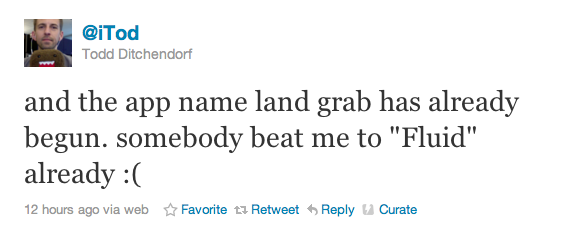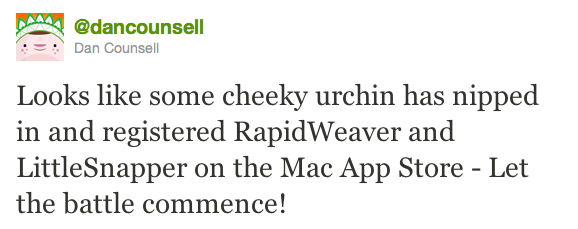Yesterday Apple opened app submissions for the Mac App Store, which as promised at the Back to the Mac event by Steve Jobs will be opening in less than 90 days – around February 2011. Developers can now submit their applications for Apple’s approval – something you want to do now as we still don’t know what policies Apple is going to adopt on the Mac.
When a developer submit an app for Apple’s approval, he has to pick up a name. But the App Store always had a problem with name reservations: developers were able to register a name, block it so no other developer could use it and never upload an actual application for approval. The name was there, frozen, but no app with that name was ever submitted. This practice is known as “name squatting”. After thousands of complaints by frustrated developers who had seen their app’s name “stolen” by suspicious individuals, Apple acknowledged the problem in mid-September and introduced a new policy: you can register an application name, but if you don’t upload anything in 90 days you’ll receive a notification informing you that in 30 days that name will no longer be assigned to you and it’ll be “unlocked” once again. With people sitting on unused names for 2 years, that was a quite welcome change.
The situation is turning out to be different, though, with the upcoming Mac App Store. Todd Ditchendorf, developer of the popular Fluid app for Mac, tweeted that he was unable to register the name “Fluid” in the Mac App Store as someone else had already taken it.
Now, this is a problem. Its cause lies in the nature of Mac software itself. As I wrote many times in the past weeks, the Mac App Store will be radically different from the current iOS App Store (at least in its first iteration we’ll see in 2011) as Mac applications have always been available through the web. On the web, no one needed to register a name and rush to submit the application file - not unless we’re talking about domain registration, which is a completely different story. But on the web, developers are free to pick up whichever name they want and roll with it. On the Mac App Store, they have to reserve a name and upload a binary. They’re under Apple’s control. The problem lies in the fact that lots of applications we’ll see on the Mac App Store day one will be popular Mac apps that have been around for years (OmniFocus, Fluid, Pixelmator) and have an established identity among users. We’re not talking about new iPhone developers submitting a fart app here. We’re talking about companies that made the history of Mac third-party software.
Apple provides no guarantee to these developers – developers who won ADAs in the past and sold millions of copies in the past decades. Everyone knows what OmniFocus is. But what if a developer comes around and picks that name?
Sure, it can happen on the iPhone and iPad as well. But on the Mac, with its history of apps available on the web and the Mac App Store being an optional way to discover and install apps, the problem is much bigger.
Update: Two more well-known Mac developers saw their apps’ names “stolen” in the Mac App Store:
Dan Counsell, Realmac Software: [tweet]
Isaiah Carew, YourHead Software: [tweet]
Update #2: The guys at Creaceed are reporting similar issues: they confirmed in the comments that the names Hydra, Prizmo, Elasty are already registered by someone else.




